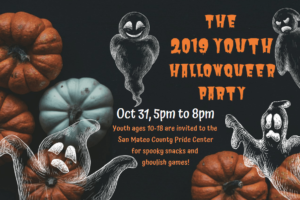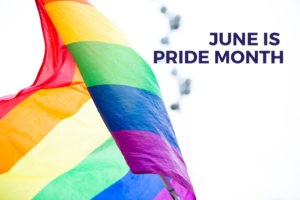MAY is Older Americans Month
On Friday night, April 27, the San Mateo County Pride Center invited community members to hear stories from the Oral History Project. Students from Notre Dame de Namur University’s “Queer Identities†class were matched in the Spring semester to interview adults and older adults in the LGBTQ+ community about their life stories. The students presented their findings to the 40-50 of us at the Pride Center on Friday evening. It was a great feeling to know that our community committed to the LGBTQ+ Oral History Project, as it is a great privilege to record someone’s life story and a great responsibility to care for that story. By conducting these oral histories, the students were able to connect one person’s story to the larger historical narrative of the LGBTQ+ community. Part of what defined the oral history project were the questions asked during the interviews. So many aspects of LGBTQ+ history were covered, including the lavender menace, the closet, institutionalized oppression, Stonewall, the AIDS epidemic, and much more. The evening proved that we are not invisible anymore!
LGBTQ+ older adults make up a significant (and growing) share of both the overall LGBTQ+ population and the larger 65+ population. While confronted with the same challenges that face all people as they age, LGBTQ+ older adults also face an array of unique constraints that may limit our way to healthy older lives.
What unique barriers do LGBTQ+ older adults face? One is the effect of social stigma, past and present. This stigma has disrupted the lives of LGBTQ+ older adults, making it harder to earn a living, save for retirement, be fully accepted in their communities and families, and access needed services. LGBTQ+ older adults are more likely to be single, childless and estranged from their biological families, and are more likely to rely on friends and community members as their chosen family. Policies and laws often do not recognize these non-traditional caregivers. Receiving unequal treatment under laws, programs and services designed to provide a safety net for older Americans means all too often that there are no safety nets for LGBTQ+ older adults. The barriers make it more challenging for LGBTQ+ older adults to achieve good health and healthcare, financial security, and social support and community engagement.
Every May, the Administration on Aging, leads our nation’s observance of Older Americans Month. When Older Americans Month was established back in 1963, only 17 million living Americans had reached their 65th birthday. About a third of older Americans lived in poverty and there were few programs to meet their needs, although interest in older Americans and their concerns was growing. Older Americans Month is celebrated across the country through ceremonies, events, and other such activities.
Engage at Every Age, this year’s theme for Older Americans Month, means that we are never too old (or young) to take part in activities that can enrich our physical, mental, and emotional well-being. It also celebrates the many ways in which older adults make a difference in our communities.
We all witnessed last Friday evening how our Pride Center promotes community-based services that support LGBTQ+ older adults to live independently. We witnessed their involvement in our community planning, events and other activities. We learned the importance of providing opportunities for LGBTQ+ older adults to volunteer, lead, learn and mentor others in our community.
During Older Americans Month, support our older adults at the Pride Center by participating at the May 18th  Intergenerational Dinner and open mic from 5 PM – 8PM. (Please RSVP ahead of time so we’ll have enough food to serve for dinner.) Support the important work of the Pride Center by attending the LGBTQ Aging Film Series in June… Honor our LGBTQ+ older adults who led the way for our basic civil rights and show your pride in celebrating Older Americans Month with us.




